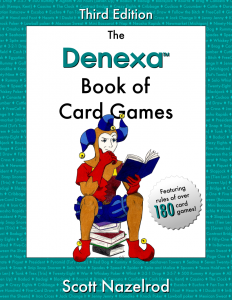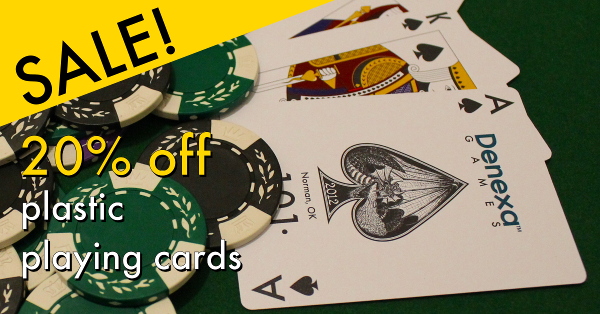Comet
Comet, also known as Commit, is a game in the Stops family for four to about eight players. As in Pope Joan, the players know about one of the game’s “stops”—the 8♦ is removed from play. Unlike in that game, though the 9♦, called the comet, is much easier to play—it functions as a wild card!
Comet is supposedly named after the 1758 pass-by of Halley’s Comet, having been invented in France around that time period. The name Commit circulated just as early, however, leading to some question as to whether it was the original name and which, if either, is a corruption in spelling for the other.
Object of Comet
The object of Comet is to be the first to score 100 points. Players score points by being the first to run out of cards on each hand.
Setup
Comet is typically played with a deck composed of 51 cards or fewer. You can make such a 51-card deck by removing the 8♦ from any standard deck, like Denexa 100% Plastic Playing Cards. You will also need something to keep score with, such as pencil and paper.
There are two methods to dealing the game. One is to simply deal out the cards as far as they will go, then simply set aside the stub. The unknown cards in the stub will be the “stops” that halt progress in the game, which players will have to discover as they play. The other method is to simply remove additional 8s (and 7s if necessary) until the deck is evenly divisible by the number of players. This has the effect of allowing players to know the stops ahead of time and adjust their strategy.
Game play
In Comet, cards rank in their usual order, with aces low.
The player to the dealer’s left goes first. They may play any card they wish, face up, to the table in front of them. Whoever holds the next higher card of the same suit then plays their card, then the next higher, and so on. Ideally, this continues until someone plays the king of that suit. Sometimes, however, it will be because the next card in the sequence would be one of the cards in the stub or the 8♦. As the game progresses, sequences may also stop due to previously-played cards. If the sequence is broken for any reason, the last person to play a card is free to play any card they desire, and the chain begins anew.
The role of the 9♦
The player holding the 9♦ (the comet) is free to play it at any time, even out of turn in an existing sequence. They may play it immediately after playing an in-sequence card, or after another player. When the 9♦ is played, normal play stops. The player to the left of the one who played the 9♦ must either play the 10♦ or the next card in the previous sequence, if any. If the player is unable to play either card, the next player to the left has the same option, and so on. Play proceeds normally after that.
For example, say a sequence begins with the A♣ and continues normally through the 6♣. Someone then plays the 9♦. The person to that player’s left must then play either the 10♦ or the 7♣. If they cannot, the next person to their left must play one of the two cards, if able, and so on.
Scoring
The player that runs out of cards first wins the hand. They score one point for winning the hand, another point for every card in their opponents’ hands, and two points for each king that was not played. If a player holds the 9♦, unplayed, at the end of the hand, they lose one point.
Pass the deal to the left, shuffle, and deal a new hand. Game play continues until one player reaches a score of 100 or more points. That player wins the game.



Leave a Reply